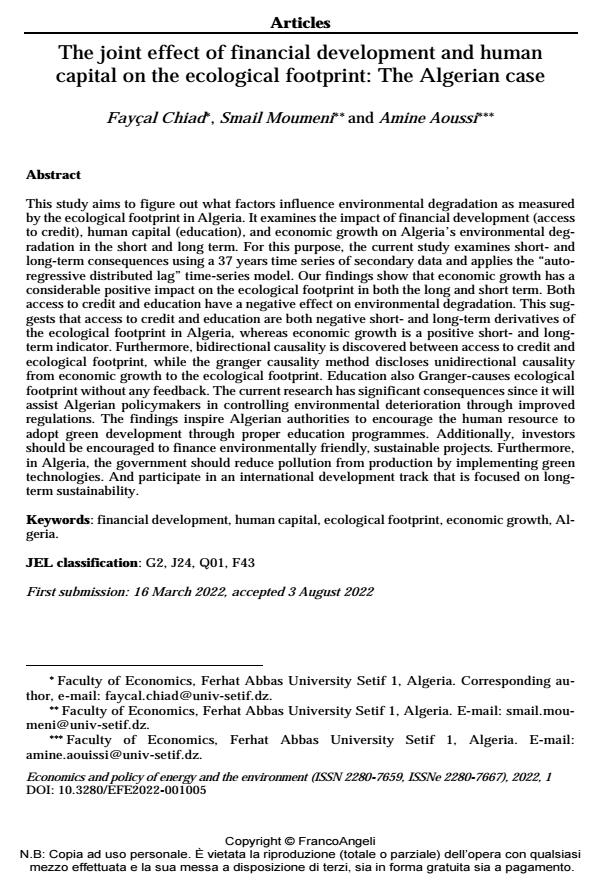The joint effect of financial development and human capital on the ecological footprint: The Algerian case
Journal title ECONOMICS AND POLICY OF ENERGY AND THE ENVIRONMENT
Author/s Fayçal Chiad, Smail Moumeni , Amine Aoussi
Publishing Year 2022 Issue 2022/1
Language English Pages 25 P. 69-93 File size 306 KB
DOI 10.3280/EFE2022-001005
DOI is like a bar code for intellectual property: to have more infomation
click here
Below, you can see the article first page
If you want to buy this article in PDF format, you can do it, following the instructions to buy download credits

FrancoAngeli is member of Publishers International Linking Association, Inc (PILA), a not-for-profit association which run the CrossRef service enabling links to and from online scholarly content.
This study aims to figure out what factors influence environmental degradation as measured by the ecological footprint in Algeria. It examines the impact of financial development (access to credit), human capital (education), and economic growth on Algeria’s environmental deg- radation in the short and long term. For this purpose, the current study examines short- and long-term consequences using a 37 years time series of secondary data and applies the "autoregressive distributed lag" time-series model. Our findings show that economic growth has a considerable positive impact on the ecological footprint in both the long and short term. Both access to credit and education have a negative effect on environmental degradation. This sug- gests that access to credit and education are both negative short- and long-term derivatives of the ecological footprint in Algeria, whereas economic growth is a positive short- and long- term indicator. Furthermore, bidirectional causality is discovered between access to credit and ecological footprint, while the granger causality method discloses unidirectional causality from economic growth to the ecological footprint. Education also Granger-causes ecological footprint without any feedback. The current research has significant consequences since it will assist Algerian policymakers in controlling environmental deterioration through improved regulations. The findings inspire Algerian authorities to encourage the human resource to adopt green development through proper education programmes. Additionally, investors should be encouraged to finance environmentally friendly, sustainable projects. Furthermore, in Algeria, the government should reduce pollution from production by implementing green technologies. And participate in an international development track that is focused on longterm sustainability.
Keywords: financial development, human capital, ecological footprint, economic growth, Algeria.
Jel codes: G2, J24, Q01, F43
Fayçal Chiad, Smail Moumeni , Amine Aoussi, The joint effect of financial development and human capital on the ecological footprint: The Algerian case in "ECONOMICS AND POLICY OF ENERGY AND THE ENVIRONMENT" 1/2022, pp 69-93, DOI: 10.3280/EFE2022-001005